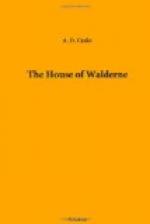But Hubert, careless of his religious duties as he had been, and almost afraid of appearing religious, could not do this, no more than Martin would have done.
Oh, how he thought of Martin. And oh, how earnestly he prayed in those days.
And here we grieve to be forced to leave our Hubert awhile.
Chapter 21: To Arms! To Arms!
Three years had passed away since the death of the Lady Sybil of Walderne.
A great change had passed over the scene. War—civil war—the fiercest of all strife—had fairly begun in the land. Lest my readers should marvel, like little Peterkin, “what it was all about,” let me briefly explain that the royal party desired absolute personal rule, on the part of the king, unfettered by law or counsellors. The barons desired that his counsellors should be held responsible for his acts, and that his power should be modified by the House of Lords or Barons, if not by the Commons as well; the latter idea was but dawning. In short, they desired a constitutional government, a limited monarchy, such as we now enjoy.
The Pope had been called upon to mediate, and had decided in favour of the King, and absolved him from his oath and obligations to his subjects, especially those “Provisions of Oxford.” Louis IX, King of France (afterwards known as Saint Louis), had been appealed to, but, though a very holy man, he was a staunch believer in the divine right of kings; and he, too, decided against the barons.
What were they to do? Most of the barons were in submission, but Earl Simon said:
“Though all should leave me, I and my four sons will uphold the cause of justice, as I have sworn to do, for the honour of the Church and the good of the realm of England.”
They changed their standing point, and, to meet the condemnation which both Pope and King of France had awarded to the “Provisions of Oxford,” took their stand upon Magna Carta instead.
But here they fared no better. In March 1264 a parliament had been summoned to meet at Oxford by the king, that he might there undo what the barons had done in 1258. At this period the action of our tale recommences.
Drogo was still lord of the Castle of Walderne. No news had reached England of Hubert these three long years, and hence no one disputed the title of Drogo to present possession. His steps had been taken with all the craft of a subtle fox. One by one he had removed all the old dwellers in the castle, and, so far as was possible, the outside tenantry also, and substituted creatures of his own—men who would do his bidding, whatsoever it were, and who had no local interests or attachment to the former family.
And, little by little, his rule had been growing as hard and cruel as that of a medieval tyrant could be. The dungeons were reopened which had long been closed; the torture chamber, long disused, was refitted, as it had been in the dreadful days of King Stephen; the defences had been looked to, the weapons furbished, for, as a war horse sniffs battle afar off, so did Drogo.




